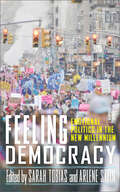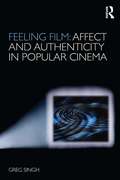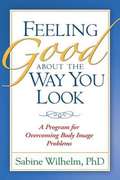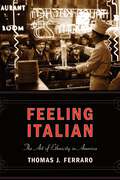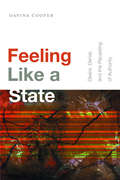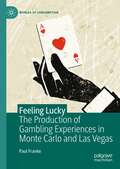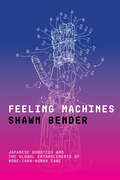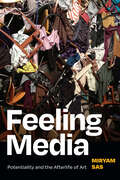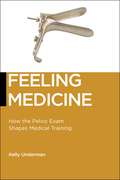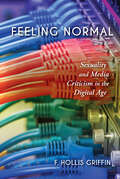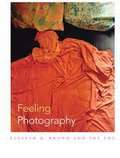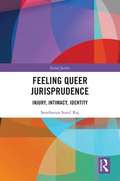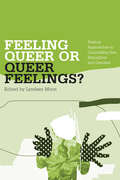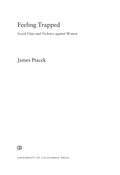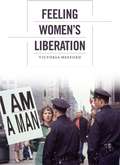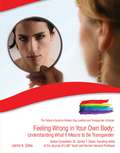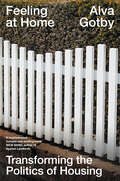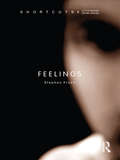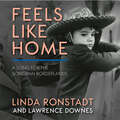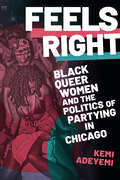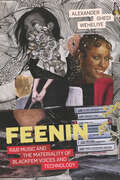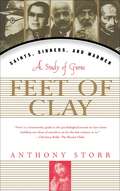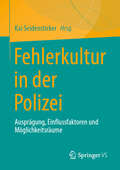- Table View
- List View
Feeling Democracy: Emotional Politics in the New Millennium (The Feminist Bookshelf: Ideas for the 21st Century)
by Sarah Tobias Arlene Stein Nermin Allam Kathryn Abrams Noëlle McAfee Ciara Torres-Spelliscy Kirin Gupta Ileana NachescuCultural critic Lauren Berlant wrote that “politics is always emotional,” and her words hold especially true for politics in the twenty-first century. From Obama to Trump, from Black Lives Matter to the anti-abortion movement, politicians and activists appeal to hope, fear, anger, and pity, all amplified by social media. The essays in Feeling Democracy examine how both reactionary and progressive politics are driven largely by emotional appeals to the public. The contributors in this collection cover everything from immigrants’ rights movements to white nationalist rallies to show how solidarities forged around gender, race, and sexuality become catalysts for a passionate democratic politics. Some essays draw parallels between today’s activist strategies and the use of emotion in women-led radical movements from the 1960s and 1970s, while others expand the geographic scope of the collection by considering Asian decolonial politics and Egyptian pro-democracy protests. Incorporating scholarship from fields as varied as law, political science, philosophy, psychoanalysis, and history, Feeling Democracy considers how emotional rhetoric in politics can be a double-edged sword—often wielded by authoritarian populists who seek to undermine democracy but sometimes helping to bring about a genuine renewal of participatory democracy.
Feeling Film: Affect And Authenticity In Popular Cinema
by Greg SinghCinema has the capacity to enflame our passions, to arouse our pity, to inspire our love. Feeling Film is a book that examines the emotional encounters found in contemporary popular cinema cultures. Examining melodrama, film noir, comic book franchises, cult indie movies and romantic comedy within the context of a Jungian-informed psychology and contemporary movements in film-philosophy, this book considers the various kinds of feelings engendered by our everyday engagements with cinema. Greg Singh questions the popular idea of what cinema is, and considers what happens during the anticipation and act of watching a movie, through to the act of sharing our feelings about them, the reviewing process and repeat-viewing practices. Feeling Film does this through a critique of purely textual approaches, instead offering a model which emphasises lived, warm (embodied and inhabited) psychological relationships between the viewer and the viewed. It extends the narrative action of cinema beyond the duration of the screening into realms of anticipation and afterlife, in particular providing insight into the tertiary and participatory practices afforded through rich media engagement. In rethinking the everyday, co-productive relationship between viewer and viewed from this perspective, Feeling Film reinstates the importance of feelings as a central concern for film theory. What emerges from this study is a re-engagement of the place of emotion, affect and feeling in film theory and criticism. In reconsidering the duration of the cinematic encounter, Feeling Film makes a significant contribution to the understanding of the inter-subjective relationship between viewer and viewed. It takes post-Jungian criticism into the realms of post-cinema technologies and reignites the dialogue between depth psychology and the study of images as they appear to, and for, us. This book will make essential reading for those interested in the relationship between film and aspects of depth psychology, film and philosophy students at advanced undergraduate and postgraduate levels, film and cinema academics and cinephiles.
Feeling Global: Internationalism in Distress (Cultural Front #5)
by Bruce RobbinsIs global culture merely a pale and sinister reflection of capitalist globalization? Bruce Robbins responds to this and other questions in Feeling Global, a crucial document on nationalism, culturalism, and the role of intellectuals in the age of globalization. Building on his previous work, Robbins here takes up the question of the status of international human rights. Robbins' conception of internationalism is driven not only by the imperatives of global human rights policy, but by an understanding of transnational cultures, thus linking practical policymaking to cultural politics at the expense of neither. Robbins' cultural criticism, in other words, affords us much more than an understanding of how culture "shapes our lives." Instead, Robbins shows, particularly in his discussions of Martha Nussbaum, Richard Rorty, Susan Sontag, Michael Walzer and others, how "culture" itself has become a term that blocks—for commentators on both the right and the left—serious engagement with the contemporary cosmopolitan ideal of a nonuniversalist discourse of human rights. Rescuing "cosmopolitanism" itself from its connotations of leisured individuals loyal to no one and willing to sample all cultures at will, Feeling Global presents a compelling way to think about the ethical obligations of intellectuals at a time when their place in the new world order is profoundly uncertain.
Feeling Good about the Way You Look
by Sabine WilhelmIn a society where a blemish or "bad hair" can ruin an otherwise perfect day and airbrushed abs dominate the magazine rack, many of us feel ashamed of our bodies. If dissatisfaction with your looks is a distressing preoccupation, this compassionate book offers a way to break free from the mirror. Harvard psychologist Sabine Wilhelm leads you through a step-by-step program that helps you fight the urge to spend hours "fixing" your skin and hair, working out, or shopping for flattering clothes. Reality-check exercises based on cognitive-behavioral therapy demonstrate how to identify unfounded beliefs about your appearance. Once you understand the negative thoughts and feelings that distort your self-image, you'll be able to shed lengthy grooming rituals and overcome the embarrassment that keeps you from enjoying life. With Dr. Wilhelm's expert guidance, you'll learn to replace self-doubt and insecurity with confidence and a positive outlook. Whether you've spent thousands on plastic surgery or avoid trips to the beach, dating, or socializing, you owe yourself this opportunity to make peace with your looks. If you or someone you care about is struggling with a body image problem, effective care is finally at hand.
Feeling Italian: The Art of Ethnicity in America (Nation of Nations #18)
by Thomas J. Ferraro2006 American Book Award, presented by the Before Columbus FoundationSouthern Italian emigration to the United States peaked a full century ago—;descendents are now fourth and fifth generation, dispersed from their old industrial neighborhoods, professionalized, and fully integrated into the “melting pot.” Surely the social historians are right: Italian Americans are fading into the twilight of their ethnicity. So, why is the American imagination enthralled by The Sopranos, and other portraits of Italian-ness? Italian American identity, now a mix of history and fantasy, flesh-and-bone people and all-too-familiar caricature, still has something to teach us, including why each of us, as citizens of the U.S. twentieth century and its persisting cultures, are to some extent already Italian. Contending that the media has become the primary vehicle of Italian sensibilities, Ferraro explores a series of books, movies, paintings, and records in ten dramatic vignettes. Featured cultural artifacts run the gamut, from the paintings of Joseph Stella and the music of Frank Sinatra to The Godfather’s enduring popularity and Madonna’s Italian background. In a prose style as vivid as his subjects, Ferraro fashions a sardonic love song to the art and iconography of Italian America.
Feeling Like a State: Desire, Denial, and the Recasting of Authority (Global and Insurgent Legalities)
by Davina CooperA transformative progressive politics requires the state's reimagining. But how should the state be reimagined, and what can invigorate this process? In Feeling Like a State, Davina Cooper explores the unexpected contribution a legal drama of withdrawal might make to conceptualizing a more socially just, participative state. In recent years, as gay rights have expanded, some conservative Christians—from charities to guesthouse owners and county clerks—have denied people inclusion, goods, and services because of their sexuality. In turn, liberal public bodies have withdrawn contracts, subsidies, and career progression from withholding conservative Christians. Cooper takes up the discourses and practices expressed in this legal conflict to animate and support an account of the state as heterogeneous, plural, and erotic. Arguing for the urgent need to put new imaginative forms into practice, Cooper examines how dissident and experimental institutional thinking materialize as people assert a democratic readiness to recraft the state.
Feeling Lucky: The Production of Gambling Experiences in Monte Carlo and Las Vegas (Worlds of Consumption)
by Paul FrankeMonte Carlo and Las Vegas have become synonymous with casino gambling. Both destinations featured it as part of a broad variety of leisure and consumption opportunities that normalized games of chance and created emotional atmospheres that supported the hedonistic aspects of gambling. Urban spaces and architecture were carefully designed to enable a rapid growth of the casino industry and produce experiences on previous unimaginable scale. Feeling Lucky, is a “making of story,” about cities which acquired a strange and captivating allure of mystery around them. It is more than a mere descriptive account, however. Combining urban history, the history of consumption, and sociological approaches it presents a compelling comparative history of Monte Carlo and the Las Vegas Strip between the 1860s and 1970s. Paul Franke takes the reader on a journey from arriving at the cities, through the carefully planned urban environments and into the famous casinos. The analysis follows the paths contemporary gamblers would have taken, right to the gambling tables and to the shifting gambling practices across a century. Franke shows that casino entrepreneurs succeeded in producing and selling gambling experiences by controlling spaces, adapt leisure practices and appeal to specific markets. Gamblers on the other hand regarded Monte Carlo and Las Vegas as places to engage in games of chance that would allow them to preserve their political, cultural, and moral identities.
Feeling Machines: Japanese Robotics and the Global Entanglements of More-Than-Human Care
by Shawn BenderIn recent years, debates over healthcare have accompanied rapid advances in technology, from the expansion of telehealth services to artificial intelligence driven diagnostics. In this book, Shawn Bender delves into the world of Japanese robots engineered for care. Care robots (kaigo robotto) emerged early in the 21st century, when roboticists began converting assembly line technologies into responsive machines for older adults and people with disabilities. These robots are meant to be felt and programmed to feel. While some greet them with enthusiasm, others fear that they might replace a fundamentally human task. Based on fieldwork in Japan, Denmark, and Germany, Bender traces the emergence of care robots in Japan and examines their impact on therapeutic practice around the world. Social science scholarship on robotics tends to be either speculative—imagining life together with robots—or experimental—observing robot-human interaction in laboratories or through short-term field studies. Instead, Bender follows roboticists developing technologies in Japan, and travels with the robots themselves into everyday sites of care, tracking the integration of robots into institutional care and the connection of care practice to robotics development. By exploring the application of Japanese robotics across the globe, Feeling Machines highlights the entanglements of therapeutic practice and technological innovation in an age of more-than-human care.
Feeling Media: Potentiality and the Afterlife of Art
by Miryam SasIn Feeling Media Miryam Sas explores the potentialities and limitations of media theory and media art in Japan. Opening media studies and affect theory up to a deeper engagement with works and theorists outside Euro-America, Sas offers a framework of analysis she calls the affective scale—the space where artists and theorists work between the level of the individual and larger global and historical shifts. She examines intermedia, experimental animation, and Marxist theories of the culture industries of the 1960s and 1970s in the work of artists and thinkers ranging from filmmaker Matsumoto Toshio, photographer Nakahira Takuma, and the Three Animators' Group to art critic Hanada Kiyoteru and landscape theorist Matsuda Masao. She also outlines how twenty-first-century Japanese artists—especially those responding to the Fukushima disaster—adopt and adapt this earlier work to reframe ideas about collectivity, community, and connectivity in the space between the individual and the system.
Feeling Medicine: How the Pelvic Exam Shapes Medical Training (Biopolitics #21)
by Kelly UndermanHonorable Mention, Sociology of the Body and Embodiment Best Publication Award, given by the Body and Embodiment Section of the American Sociological AssociationThe emotional and social components of teaching medical students to be good doctorsThe pelvic exam is considered a fundamental procedure for medical students to learn; it is also often the one of the first times where medical students are required to touch a real human being in a professional manner. In Feeling Medicine, Kelly Underman gives us a look inside these gynecological teaching programs, showing how they embody the tension between scientific thought and human emotion in medical education. Drawing on interviews with medical students, faculty, and the people who use their own bodies to teach this exam, Underman offers the first in-depth examination of this essential, but seldom discussed, aspect of medical education. Through studying, teaching, and learning about the pelvic exam, she contrasts the technical and emotional dimensions of learning to be a physician. Ultimately, Feeling Medicine explores what it means to be a good doctor in the twenty-first century, particularly in an era of corporatized healthcare.
Feeling Normal: Sexuality and Media Criticism in the Digital Age
by F. Hollis GriffinAn analysis of emerging LGBTQ+ media, queer spaces in urban areas, and sexual identity.The explosion of cable networks, cinema distributors, and mobile media companies explicitly designed for sexual minorities in the contemporary moment has made media culture a major factor in what it feels like to be a queer person. F. Hollis Griffin demonstrates how cities offer a way of thinking about that phenomenon. By examining urban centers in tandem with advertiser-supported newspapers, New Queer Cinema and B-movies, queer-targeted television, and mobile apps, Griffin illustrates how new forms of LGBTQ+ media are less “new” than we often believe. He connects cities and LGBTQ+ media through the experiences they can make available to people, which Griffin articulates as feelings, emotions, and affects. He illuminates how the limitations of these experiences—while not universally accessible, nor necessarily empowering—are often the very reasons why people find them compelling and desirable.“As a guide to emerging queer media of our new century, Hollis Griffin is funny, generous, passionate, and lucid. Whether he’s explaining Grindr’s memes or the gayborhoods of Chicago, cable travel programs or online networks, Griffin discovers how it feels to be queer in the digital age.” —Amy Villarejo, author of Ethereal Queer: Television, Historicity, Desire“Offers a piercing examination of modern identity politics focused on relationships among new forms of media consumption and marketplaces, urban centers, and the experiences of sexual minorities. . . . Feeling Normal is a must-read for scholars and students in queer studies and communication, media studies, film studies, and sociology.” —Choice
Feeling Photography
by Elspeth H. Brown Thy PhuThis innovative collection demonstrates the profound effects of feeling on our experiences and understanding of photography. It includes essays on the tactile nature of photos, the relation of photography to sentiment and intimacy, and the ways that affect pervades the photographic archive. Concerns associated with the affective turn--intimacy, alterity, and ephemerality, as well as queerness, modernity, and loss--run through the essays. At the same time, the contributions are informed by developments in critical race theory, postcolonial studies, and feminist theory. As the contributors bring affect theory to bear on photography, some interpret the work of contemporary artists, such as Catherine Opie, Tammy Rae Carland, Christian Boltanski, Marcelo Brodsky, Zoe Leonard, and Rea Tajiri. Others look back, whether to the work of the American Pictorialist F. Holland Day or to the discontent masked by the smiles of black families posing for cartes de visite in a Kodak marketing campaign. With more than sixty photographs, including twenty in color, this collection changes how we see, think about, and feel photography, past and present.Contributors. Elizabeth Abel, Elspeth H. Brown, Kimberly Juanita Brown, Lisa Cartwright, Lily Cho, Ann Cvetkovich, David L. Eng, Marianne Hirsch, Thy Phu, Christopher Pinney, Marlis Schweitzer, Dana Seitler, Tanya Sheehan, Shawn Michelle Smith, Leo Spitzer, Diana Taylor
Feeling Queer Jurisprudence: Injury, Intimacy, Identity (Social Justice)
by Senthorun Sunil RajThis book draws on the analytic and political dimensions of queer, alongside the analytic and political usefulness of reading emotion, to navigate legal interventions aimed at addressing the rights of LGBT people. Scholars, activists, lawyers, and judges concerned with eliminating violence and discrimination against LGBT people have generated passionate conversations about pursuing law reform to make LGBT injuries, intimacies, and identities visible, while some challenge the ways legal systems marginalise queer minorities. Senthorun Sunil Raj contributes to these ongoing conversations by using emotion as an analytic frame to reflect on the ways case law seeks to "progress" the intimacies and identities of LGBT people from positions of injury. This book catalogues a range of cases from Australia, United States, and United Kingdom to unpack how emotion shapes the decriminalisation of homosexuality, hate crime interventions, anti-discrimination measures, refugee protection, and marriage equality. While emotional enactments in pro-LGBT jurisprudence enable new forms of recognition and visibility, they can also work, paradoxically, to cover over queer intimacies and identities. Raj shows that reading jurisprudence through emotions can make space in law to affirm, rather than disavow, intimacies and identities that queer conventional ideas about "LGBT progress", without having to abandon legal pursuits to better protect LGBT people. This book will be of interest to students and scholars of human rights law, gender and sexuality studies, and socio-legal theory.
Feeling Queer or Queer Feelings?: Radical Approaches to Counselling Sex, Sexualities and Genders
by Lyndsey MoonFeeling Queer or Queer Feelings? presents highly innovative and contemporary ideas for counsellors, counselling and clinical psychologists and psychotherapists to consider in their work with non-heterosexual clients. Ground-breaking ideas are presented by new thinkers in the area for issues such as: coming out transgender desire theoretical modalities in working with HIV the role of therapy in bondage and discipline, domination and submission, and sadomasochism the use of queer theory in therapeutic research. Feeling Queer or Queer Feelings? will challenge present ideas about sex, gender and sexuality, and will prove to be invaluable for clinicians in this field.
Feeling Trapped: Social Class and Violence against Women (Gender and Justice #9)
by James PtacekThe relationship between class and intimate violence against women is much misunderstood. While many studies of intimate violence focus on poor and working-class women, few examine the issue comparatively in terms of class privilege and class disadvantage. James Ptacek draws on in-depth interviews with sixty women from wealthy, professional, working-class, and poor communities to investigate how social class shapes both women's experiences of violence and the responses of their communities to this violence. Ptacek's framing of women's victimization as "social entrapment" links private violence to public responses and connects social inequalities to the dilemmas that women face.
Feeling Women's Liberation
by Victoria HesfordThe term women's liberation remains charged and divisive decades after it first entered political and cultural discourse around 1970. In Feeling Women's Liberation, Victoria Hesford mines the archive of that highly contested era to reassess how it has been represented and remembered. Hesford refocuses debates about the movement's history and influence. Rather than interpreting women's liberation in terms of success or failure, she approaches the movement as a range of rhetorical strategies that were used to persuade and enact a new political constituency and, ultimately, to bring a new world into being. Hesford focuses on rhetoric, tracking the production and deployment of particular phrases and figures in both the mainstream press and movement writings, including the work of Kate Millett. She charts the emergence of the feminist-as-lesbian as a persistent "image-memory" of women's liberation, and she demonstrates how the trope has obscured the complexity of the women's movement and its lasting impact on feminism.
Feeling Wrong in Your Own Body: Understanding What It Means to Be Transgender
by Jaime A. SebaBoys who play with Barbie dolls. Girls who join the football team. What is gender? What are gender roles? What's the difference between being a tomboy and being transgender? Is it possible to be in the wrong body? Explore the answers to these questions with an in-depth look at what it means to be transgender, based on the personal experiences of the men and women who have taken steps to transition. Learn from the experiences of transgender young people who make the significant choice to live openly as another gender while still in high school. Uncover the reality of this often misunderstood group and how it fits into the LBGT community.
Feeling at Home: Transforming the Politics of Housing
by Alva GotbyOur feelings about housing are political, and a grasp of them is essential to solving the housing crisis – from the author of They Call It LoveHousing is more than bricks and mortar. The home is where our hopes and dreams play out, and it lies at the heart of our lives. This is where we rest, eat, and relax. The home we enjoy can determine our health, life expectancy, and day-to-day well-being. In contrast, the lack of a stable residence can lead to mental and physical illness and often premature death. This is central to how we conceive of a good and dignified life.Feeling at Home grapples with the practical and emotional questions of housing – domestic labour, privacy, security, ownership, and health. Is it possible to imagine success without home ownership? Alva Gotby makes clear that solving the housing crisis is about much more than housing stock. It is about revolutionising our everyday lives and labours.
Feelings (Shortcuts)
by Stephen FroshEveryone talks about their feelings, but what exactly are they? What are the distinguishing features of feelings, and how do they differ from emotions and affects? How do our feelings influence the kinds of people we are, and the sorts of communities and societies in which we live? In this wonderful short book, acclaimed author Stephen Frosh interrogates the terrain of feelings and asks how this ‘hidden’ dimension of the self helps shape our worlds. The book provides an accessible and thought-provoking introduction to the major debates around feelings in the modern world. Feelings is an accessible and engaging resource for students, academics, and indeed anyone with an interest in gaining a better understanding of this fundamental area of life.
Feels Like Home: A Song for the Sonoran Borderlands
by Linda Ronstadt Lawrence DownesA San Francisco Chronicle Bestseller2023 Southwest Book of the Year Selection"The arid land that starts in Arizona and stretches into Mexico's west coast is Ronstadt's foothold in the world. It's a story she has told through music, and now wants to tell through food."—The New York Times"The book is many things at once. It’s a portrait of a place, the Sonoran Desert, and it’s a genealogy of sorts, an archival romp through Ronstadt’s family history."—Vogue"An album of loves for the high desert of Sonora and Ronstadt's hometown of Tucson."—NPRRock and Roll Hall of Famer Linda Ronstadt takes readers on a journey to the place her soul calls home, the Sonoran Desert, in this candid new memoir.In Feels Like Home, Grammy award-winning singer Linda Ronstadt effortlessly evokes the magical panorama of the high desert, a landscape etched by sunlight and carved by wind, offering a personal tour built around meals and memories of the place where she came of age. Growing up the granddaughter of Mexican immigrants and a descendant of Spanish settlers near northern Sonora, Ronstadt’s intimate new memoir celebrates the marvelous flavors and indomitable people on both sides of what was once a porous border whose denizens were happy to exchange recipes and gather around campfires to sing the ballads that shaped Ronstadt’s musical heritage. Following her bestselling musical memoir, Simple Dreams, this book seamlessly braids together Ronstadt’s recollections of people and their passions in a region little understood in the rest of the United States. This road trip through the desert, written in collaboration with former New York Times writer Lawrence Downes and illustrated throughout with beautiful photographs by Bill Steen, features recipes for traditional Sonoran dishes and a bevy of revelations for Ronstadt’s admirers. If this book were a radio signal, you might first pick it up on an Arizona highway, well south of Phoenix, coming into the glow of Ronstadt’s hometown of Tucson. It would be playing something old and Mexican, from a time when the border was a place not of peril but of possibility.
Feels Right: Black Queer Women and the Politics of Partying in Chicago
by Kemi AdeyemiIn Feels Right Kemi Adeyemi presents an ethnography of how black queer women in Chicago use dance to assert their physical and affective rights to the city. Adeyemi stages the book in queer dance parties in gentrifying neighborhoods, where good feelings are good business. But feeling good is elusive for black queer women whose nightlives are undercut by white people, heterosexuality, neoliberal capitalism, burnout, and other buzzkills. Adeyemi documents how black queer women respond to these conditions: how they destroy DJ booths, argue with one another, dance slowly, and stop partying altogether. Their practices complicate our expectations that life at night, on the queer dance floor, or among black queer community simply feels good. Adeyemi’s framework of “feeling right” instead offers a closer, kinesthetic look at how black queer women adroitly manage feeling itself as a complex right they should be afforded in cities that violently structure their movements and energies. What emerges in Feels Right is a sensorial portrait of the critical, black queer geographies and collectivities that emerge in social dance settings and in the broader neoliberal city.Duke University Press Scholars of Color First Book Award recipient
Feenin: R&B Music and the Materiality of BlackFem Voices and Technology
by Alexander Ghedi WeheliyeIn Feenin, Alexander Ghedi Weheliye traces R&B music’s continuing centrality in Black life since the late 1970s. Focusing on various musical production and reproduction technologies such as auto-tune and the materiality of the BlackFem singing voice, Weheliye counteracts the widespread popular and scholarly narratives of the genre’s decline and death. He shows how R&B remains a thriving venue for the expression of Black thought and life and a primary archive of the contemporary moment. Among other topics, Weheliye discusses the postdisco evolution of house music in Chicago and techno in Detroit, Prince and David Bowie in relation to appropriations of Blackness and Euro-whiteness in the 1980s, how the BlackFem voice functions as a repository of Black knowledge, the methods contemporary R&B musicians use to bring attention to Black Lives Matter, and the ways vocal distortion technologies such as the vocoder demonstrate Black music’s relevance to discussions of humanism and posthumanism. Ultimately, Feenin represents Weheliye’s capacious thinking about R&B as the site through which to consider questions of Blackness, technology, history, humanity, community, diaspora, and nationhood.
Feet Of Clay: The Power and Charisma of Gurus
by Anthony StorrIn his classic work, Solitude, internationally acclaimed author and psychiatrist Anthony Storr probed our basic and often unmet need for solitude, especially emphasizing its relation to creativity. In Music and the Mind, Storr explored the fundamental human need for music, demonstrating its ability to reunite the mind and body. Now, in Feet of Clay, Storr again provides a fresh perspective into one of the most potentially dangerous human needs, the need for certitude. In vivid portraits of some of history's most intriguing gurus, from David Koresh to Freud and Jung to Jesus, Storr examines why we are so enthralled with certain dogmatic figures who play on our need for certainty. Gurus are extraordinary individuals who cast doubt upon current psychiatric distinctions between sanity and madness. Because gurus are charismatic figures who are gifted teachers, they recruit disciples who adopt the guru's vision as their own. The guru convinces others that he knows, a persuasive capacity which can bring illumination but which may end in disaster. Storr demonstrates that most of us harbor irrational beliefs, and he discusses how the human wish for certainty in an insecure world leads to our confusing delusion with truth. Storr reveals how the adoration for the guru can so easily corrupt him and explains why certain gurus become moral parasites while others become spiritual beacons.
Fehlerkultur in Organisationen: Eine organisationsethnografische Studie in der stationären Altenpflege (Organisation und Pädagogik #33)
by Kerstin BestvaterIm Zentrum dieser Studie steht die Frage nach der Verflechtung der Fehlerkultur mit den Entscheidungs- und Handlungspraktiken in einer Alten- und Pflegeeinrichtung. Dafür wurde mit der pädagogischen Organisationsethnografie ein explorativer Zugang zum Forschungsgegenstand gewählt, der einen tiefen Einblick in die soziale Welt der Altenpflege gewährt. Kernstück ist eine konzeptualisierende Darstellung feldtypischer Praktiken und eine gegenstandsbezogene Theorieentwicklung, die im Sinne der Grounded Theory umgesetzt wurde. Das genuine Dilemma der Altenpflege zwischen Wirtschaftlichkeit und Pflegeethos führt zu Praxismustern, die als Problemlösungsstrategien auch die Fehlerkultur prägen.
Fehlerkultur in der Polizei: Ausprägung, Einflussfaktoren und Möglichkeitsräume
by Kai SeidenstickerEin Großteil der polizeilichen Praxis findet sichtbar im öffentlichen Raum statt und ist von unterschiedlichen, teilweise nur in Ansätzen beeinflussbaren Dynamiken betroffen. Daher sollte es nicht verwundern, dass dabei auch Fehler auftreten und bekannt werden. Der Umgang mit Fehlern, also die Art wie Fehler betrachtet und bearbeitet werden, kann allerdings sehr unterschiedlich ausgeprägt sein. Die Beiträge dieses Sammelbands untersuchen dieses Thema aus unterschiedlichen Blickwinkeln systematisch.
